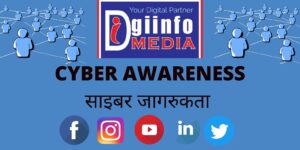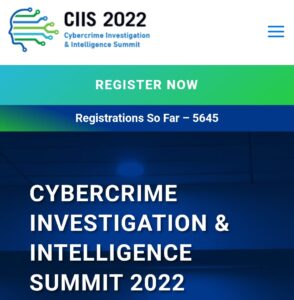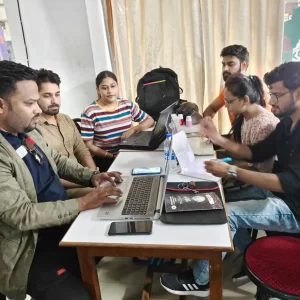
Legal Aspects of Internet Shutdown
By Ankur Rajput:-
The current outbreak of Covid-19 is detrimental to the whole world. Ever wondered if in these situations you were forced by law to get a Digital Curfew?
Digital Curfew means an Internet Shutdown, yes imagining life without internet services sounds scary right!!! But unfortunately India as a nation has given longest shutdown for 1.36 million people living in the state of Jammu and Kashmir for the period of 213 days (4th August, 2019 to 20th March, 2020). The reason is very obvious, the ‘public safety’ and ‘public emergency’ are used as rationale for giving the orders for internet shutdown. But if this rationale violates the fundamental rights and gives an economic loss to the merchants of states then who will be held accountable for the same.
Manipur government ordered three days shutdown of mobile internet service because of clashes between two villages over a land dispute.
In M.P. state government issued an order for five days of internet shutdown because farmers are demanding high rates of their produce. As per the assessment done by SFLC, since last two years India has shut down internet services for around 240 times which is highest among any country. If internet ‘kill switch’ is pressed for abrogation of Article 370 of Constitution of India, decision on Ayodhya dispute or even for anti-citizenship law protesters these issues make sense for a reasonable time but stopping internet for land dispute, farmers demanding for their rights is not justifiable.
The concern is about the legal system, that everyone is getting the permission of Digital Curfew very easily.
The question is how the order of shutting down of internet services is passed and who is accountable for the breach of fundamental rights.
In August, 2017 Government notified the Temporary Suspension of Telecom Services (Public Emergency or Public Safety) Rules under the Indian Telegraph Act, 2017, which lays down the procedure to put the restrictions on internet access. Prior to that Internet shutdowns were ordered under two legislations and these are as follows:
1.Section 144 Code of Criminal Procedure, 1973 (CrPC) by (District Magistrate or Police Official)
2.Section 5 (2) Indian Telegraph Act, 1885 (ITA).
As per the mentioned rules, 2017 under ITA, the order for suspension of telecom services grants powers to the Secretary of the Government of India in the Ministry of Home Affairs and in case of a State Government, such order can be issued by the Secretary of the State Government in-charge of the Home Department (Competent Authority).
In situations of “unavoidable circumstances”, such an order can be issued by an officer of the rank of a Joint Secretary to the Government of India or above, who has been authorized to issue such order by the Union Home Secretary or the State Home Secretary as the case may be.
The most important point as per the aforementioned Rules, 2017 is “Provided further that the order of suspension of telecom services shall cease to exist in case of failure of receipt of confirmation from the competent authority within the said period of 24 hours”. The rules also mentioned about constituting a review committee with Cabinet Secretary as chairman and the copy of order must be forwarded to the concerned review committee.
The process is defined well, but the term ‘Public Safety’ and ‘Public Emergency’ is not defined anywhere, the time duration (max or min) is not defined anywhere and state governments in some cases rather than using technical measures opt for internet shutdown violating the Right to speech and expression under Article 19 (1) (a) and the right to carry on any trade or business under Article 19 (1) (g) of the Constitution of India. The same issue is raised in a petition by Anuradha Basin, which challenged the curbing of media freedom in the state. The court held that “the rights under Article 19 (1) (a) and Article 19 (1) (g), using the medium of internet is constitutionally protected. The declaration of the court mention that cut back of internet access has to be reasonable and laid down by Article 19 (2) and 19 (6) of the Constitution.
The court also held that Rule 2(2) of the Telecom Suspension Rules, states that every order passed by any competent authority must be a reasonable order and the proportionality principle must be followed while giving restriction of internet services while keeping in mind the fundamental rights of people.
One last important point mentioned by hon’able Supreme Court is that suspending internet services indefinitely is impermissible, review committee is in-charge to look into compliance with the requirements of Section 5 (2) of the Telegraph Act as well as the proportionality of orders.
The judgment of Apex Court was reasonable and proportional but in coming days if internet “kill switch” is pressed for small protests or for any festivals of communities then, there must be a need for defining the words “Public Safety” and “Public Emergency”.





Useful article
This article clearly gives the well picture of the controversy between the government needs and the people’s needs. It also contain the legal proofs for the step taking by the government .
It is informative
An instructive article indeed!!
The article highlights how the judiciary has taken a stand on controversial question of internet shutdowns being a violation of article 19 (1)(a) and 19(1)(g) and made it clear that internet shutdowns are reasonable restrictions imposed under article 19(2) and 19(6) of the Constitution.
Numerous articles examining sociological implications of internet shutdown have been published at various online platforms but a legal approach was missing. The article rightly highlights various questions underlying violation of fundamental rights. Efforts to examine laws beyond the Constitution of India is highly appreciated. The views are my personal opinion that are open to criticism.
A very informative article and highlights the impact and legal aspects of the same.
Right to internet is also known right to connect, is in th view that all.must be avail to access the internet
Wonderful Article!!
The last part also talked about the COVID – 19 pandemic and how important the internet is during such a health crisis in India. Internet shutdowns have gradually become a popular component of the wider array of State responses like curfews, media clampdowns, and others. People mostly depend on the Internet to stay in touch with family and friends, create local communities of interest, report public information, and access and share knowledge. Thanks for such an informative article. Many Fundamentals are being violated by the State. Action must be taken!
A very interesting and unique article. The governments of the worlds have time and again tried to suppress the word of the public by various forms, and ‘kill switch’ or ‘digital curfew’ is the latest and the easiest way to do it. The rules mentioned under the telegraph act seemed arbitrary in nature, curbing down citizen’s fundamental rights without any proper justification. the author has really done a commendable job on the article, mentioning all the relevant sections of laws.
Internet shutdown should only be done when it is essentially needed. The article talks about how government is now using this tool for such unnecessary reasons. Thus, there should be a regulatory body incharge of reviewing the reason and time period for internet shutdown.
very interesting article
Internet is a basic need of humans at this stage of society. Staving off internet indefinitely would be unconstitutional. This Article provides the procedure when a decision is made to Stop the facilities of internet in a particular state and limits of such order by the authorities which are secretary of home affairs at state and center level.
India had the highest number of internet shutdowns in 2018. As held in the Anuradha Bhasin judgement, internet shutdown was to be used as a last resort for public safety but India has been using it various other reasons. Apart from hampering a person’s freedom of speech and expression, it also violates right to education and medical care under article 21.
The need for a regulatory body is very important
Rightly said. Internet Shutdown is being used as a kill switch to avoid small protests. Such restrictions should be made only in unavoidable circumstances and this requires some regulations as this is infringing rights of the people suffering from internet shutdowns every now and then.
Very well written article. With a great power, comes a huge responsibility. But sometimes powers are misused according to one’s own needs. The power in the hands of government are of wider nature and these should only be used in a positive manner which benefits the society as a whole. The points raised by the author in this article shows that sometimes these powers are misused. Internet shutdown should only be done on account of “public safety” and “national/state level security”,and should not infringe the fundamental rights in any way. Just to shut people up, government is using their powers and that’s a grey area in our democratic country.